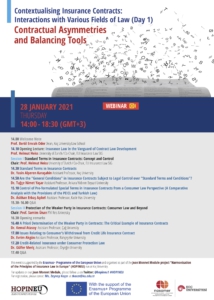Online seminar “New challenges and opportunities concerning the rights of the child in cross-border cases”, including Regulation Brussels II ter – Universidad de Valencia, 28 January 2021 (in Spanish/Portuguese)
The Universidad de Valencia is organizing a seminar entitled “nuevos desafíos y oportunidades de los derechos del menor en asuntos transfronterizos”, to be held on 28 January 2021 online (in Spanish / and Portuguese in one panel). The Conflictus Legum blog published information about this seminar here.
This seminar is held in the context of “Minor’s Right to Information in civil actions (MiRI) – Improving children’s right to information in cross-border civil cases”, a Project co-funded by the European Union Justice Programme 2014-2020, JUST-JCOO-AG-2018, under Grant Agreement No 831608.
Among the speakers are: Cristina González Beilfuss, Andrés Rodríguez Benot, Mónica Herranz Ballesteros, Isabel Reig Fabado, Elena Rodríguez Pineau, Mercedes Soto Moya, María Carmen Chéliz Inglés, Idoia Otaegi Aizpurua, David Carrizo Aguado, etc.
The Council Regulation (EU) 2019/1111 of 25 June 2019 on jurisdiction, the recognition and enforcement of decisions in matrimonial matters and the matters of parental responsibility, and on international child abduction (Brussels II ter Regulation) will be discussed throughout the day (but particularly in panel #1).
Participation is free of charge (and there is no need to register). The link to the seminar is here.



